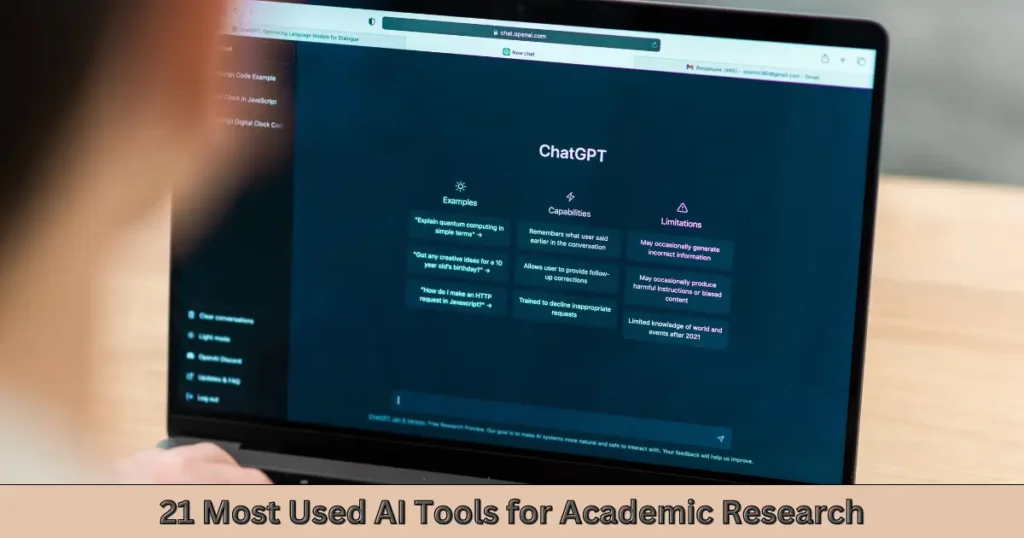
The introduction of AI-powered technologies, including AI tools for students and AI tools for academic research, has completely revolutionised how academics engage with scholarly material in their field of study. Paper Pal, Trinka, Writesonic, and SciSpace stand out among these innovative tools, offering services that simplify tasks such as reading articles, editing, creating content, and managing research. These AI tools for academic research have features, such as citation extraction, summarisation, and collaboration capabilities, designed to enhance research productivity and efficiency for students and researchers.
These AI-powered technologies serve as essential AI tools for academic research and student learning and provide invaluable support to scholars navigating the vast landscape of scholarly knowledge. They enable users to extract insights, organise references, and advance their research endeavours more effortlessly and effectively, thereby marking a significant leap forward in academic research methodologies.
1. ChatGPT
ChatGPT has become an invaluable tool for academic research, particularly for research scholars. Its ability to process and generate human-like text based on vast data makes it an excellent assistant for literature reviews, hypothesis generation, and even drafting research proposals. Scholars can interact with ChatGPT to explore various research topics, understand complex theories, and get summaries of relevant studies, significantly speeding up the initial phases of their research projects.
ChatGPT’s capabilities extend to aiding in data analysis and interpretation, especially in qualitative research where textual data can be voluminous and complex. Providing insights and patterns within the data assists researchers in drawing meaningful conclusions, thereby enhancing the quality and depth of academic inquiries. This AI-driven approach is reshaping educational research, making it more efficient and comprehensive.
2. Paper Pal
Paperpal can serve as your personal AI research assistant. The goal of this tool is to facilitate the reading of scholarly articles. Paperpal can extract critical insights, summarise papers succinctly, and generate citation lists. Ultimately, this increases the effectiveness of your research. You can quickly assimilate and refer to the study content without exerting additional effort.
3. Consensus
Consensus looks similar to most search engines, but what makes it unique is that it asks Yes/No questions and responds with the consensus of academic experts. If ChatGPT and Google Scholar got married, their child would be Consensus — an AI-powered search engine.
4. Quillbot
QuillBot transforms your approach to content production and is more than simply a writing tool. It’s your go-to writing wizard. QuillBot enables writers to improve their writing productivity, originality, and quality with sophisticated AI-powered features. The days of having trouble choosing words or structuring sentences are long gone. QuillBot users can quickly write high-quality content with just a few clicks because of its straightforward interface and robust algorithms.
5. Scite.ai
Scite.ai stands out as a dependable and accurate resource in the age of digital research, where error and excess information are commonplace. This cutting-edge online research tool is turning the academic scene upside down by giving academics a reliable partner in their search for genuine citations.
6. Typeset.io
Take the stress out of writing and publishing using Typeset.io, the master of automated formatting and pre-made manuscript templates. With Typeset.io, say goodbye to laborious formatting chores and hello to a more efficient writing experience. Typeset.io is an intelligent tool that makes writing easier while maintaining the formatting of the highest calibre. Content creators can concentrate on creating their work, knowing that Typeset.io will take care of the rest.
7. Research Rabbit
You can do research fast-tracked with Research Rabbit, a fantastic tool. Most importantly, it’s free. However, the majority of academics are unaware of it. Described by its creators as the Spotify of research, Research Rabbit facilitates the addition of scholarly articles to collections. The software can gather information about the user’s interests using these collections and generate fresh, pertinent recommendations.
8. Scholarcy
Your digital helper to navigate the overwhelming amount of reports, articles, and book chapters. Scholarcy is your one-stop shop for staying up to date on the most recent research, offering automatic extraction of references, Chrome and Edge plugins, and a searchable library of summary cards.
9. Elicit.org
The creators of Elicit refer to it as the AI research assistant and state that it also employs language models to provide answers. Nevertheless, its knowledge is purely empirical, allowing for intelligent conversations and idea generation with a highly qualified and credible source. Additionally, the software can locate pertinent publications that don’t have exact keyword matches, summarise them, and extract essential data.
10. Trinka
An AI-powered editing tool, Trinka, was created for use in academic research. Academic and technical writing is an online grammar check and language correction AI tool. This AI program ensures that the information in your research papers is thoroughly researched and presented appropriately.
11. Writesonic
With the Writesonic AI-powered tool, you can generate text based on your defined input prompts for any document you need to write, including reports and articles. You will save time and effort by doing this instead of spending it in writing. Writesonic, in particular, helps scholars to produce excellent and superior materials.
12. Wordvice AI
Say goodbyes to the days of struggling with spelling, grammar, and style errors in your academic writing. With real-time improvements and helpful suggestions on general fluency, Wordvice AI Writing Assistant can help you save your content. It’s not just grammar; this powerhouse also has tools for summarising and paraphrasing to add uniqueness to your writing. It’s similar to having an AI-fluent personal writing tutor.
13. SciSpace
SciSpace is regarded as an all-in-one platform for research writing, with several features that simplify the research process. This includes research management, AI-driven formatting, and collaborative capabilities. This all-inclusive strategy allows researchers to administer their courses, provide high-quality content, and work well with others.
14. Chat Pdf
ChatPDF is an AI-powered PDF editor created for modifying and annotating PDF files. This simplifies the management and retrieval of data from research publications. ChatPDF is a valuable tool for managing large documents and can annotate, highlight, or extract data from PDFs.
15. Magic School
Machine learning and AI are the foundation of the MagicSchool.ai platform. It includes many tools and courses to assist researchers in keeping current on developments in this rapidly expanding field. Use MagicSchool.ai to gain insightful information and knowledge to advance your research skills, regardless of your experience level.
16. Read Cube Papers
ReadCube Papers is a powerful tool for managing references and building research libraries. It makes it easier for researchers to access and arrange their study literature quickly. Citation management, PDF annotations, and interactions with academic databases are just a few of the beautiful capabilities offered by this program. Use this crucial tool to improve the efficiency of your research workflow.
17. Mirror Think
Mirrorthink AI is more than just your average automation; it’s a symphony of AI-powered tools that make accurate and timely judgments. Envision a digital wizard automating data gathering and analysis with the skill of an experienced practitioner, providing real-time insights akin to magicians divulging secrets.
18. Jenni.Ai
Jenni Ai is a partner in creativity regarding words, not just a tool for writing. Jennifer serves bloggers, academics, and journalists with features including autocomplete, citation support for many formats, and an integrated plagiarism detector.
19. SciSummary
SciSummary AI, a clever sidekick that enters the digital world, makes researchers’ and students’ lives easier. It’s a powerful tool with capabilities that go above and beyond the typical; it’s not just your average utility.
20. Next Net
Next Net is an artificial intelligence (AI) platform for health and medical research that facilitates exploring and discovering novel medications and therapies. Genes, proteins, illnesses, medications, and other biomedical items are all represented in a comprehensive and searchable knowledge graph produced using deep learning and graph neural networks. Researchers can explore and interact with the graph through its different features, which include pathfinding, subgraph search, and similarity search. Drug and health research can be advanced and accelerated with the help of the Next Net.
21. Paper brain
Researchers may quickly and accurately obtain information about any article using article Brain, an AI-powered paper analysis tool. Every publication uses natural language processing and machine learning to provide digestible information, such as accomplishments, history, context, and discussions. Researchers can also use it to ask questions and receive answers regarding the work, including its main contribution, limitations, and future directions. Paper Brain is a fantastic resource for learning and remembering research papers, information, and ideas.
Conclusion
Researchers looking to increase productivity and optimise workflow have found that integrating AI-powered technologies, such as Paper Pal, Trinka, Writesonic, and SciSpace, is becoming increasingly crucial as the academic landscape changes. By utilising these tools, scholars can enhance their research attempts with better efficiency and precision, obtain new insights, and manage the complexity of scholarly literature more efficiently. With AI on their side, scholars may confidently set out on their scholarly travel, knowing they have the resources necessary to succeed in their quest for knowledge.
FAQs About AI Tools for Academic Research
What are AI tools for students, and how do they help in academic research?
The AI tools for academic research are software applications or platforms that leverage artificial intelligence to assist with various learning and educational research aspects. These scholarly research AI tools can help students by providing personalised learning experiences, automating repetitive tasks such as summarisation and citation extraction, and offering advanced capabilities like plagiarism checks and grammar corrections. They significantly enhance efficiency, understanding, and engagement with academic material, making them indispensable in educational research.
Can AI tools for academic research improve the quality of scholarly work?
AI tools for academic research, or the best AI tools for academic research, can significantly improve the quality of scholarly work. These tools offer advanced data analysis, trend prediction, and content generation capabilities. They assist researchers in sifting through vast amounts of data to find relevant information, identify patterns, and generate new insights. Furthermore, these AI academic research tools can improve the accuracy of citations, ensure the originality of content, and facilitate collaboration among researchers, leading to higher-quality research outputs.
Are AI tools for students and researchers easy to use without technical expertise?
Many AI tools for students and researchers are designed with user-friendly interfaces to ensure ease of use without requiring extensive technical expertise. These AI tools and academic research platforms often provide tutorials, support resources, and intuitive features to guide users through their functionalities. However, the complexity can vary depending on the tool, so some may require a basic understanding of AI concepts or data analysis.
How do AI tools for academic research ensure the security and privacy of data?
AI tools for academic research, particularly the best AI tools for scholarly research, prioritise data security and privacy through various measures, including encryption, secure data storage, and compliance with data protection regulations such as GDPR. Users are typically required to agree to privacy policies that outline how their data will be used and protected. Many of these AI tools for academic research platforms offer customisable privacy settings, allowing users to control the sharing and accessibility of their research data.
Related Topic:
